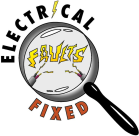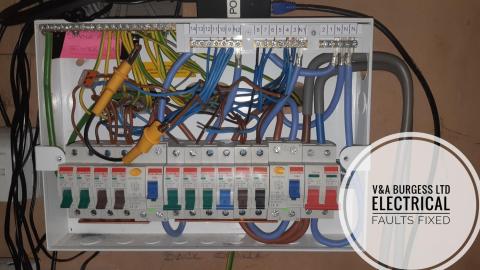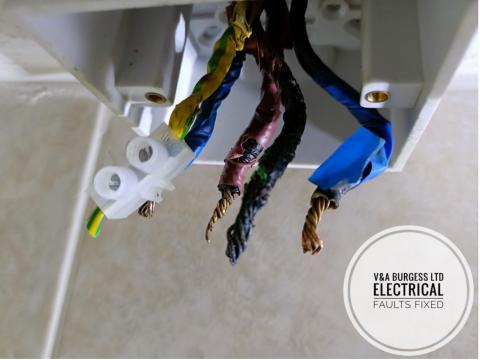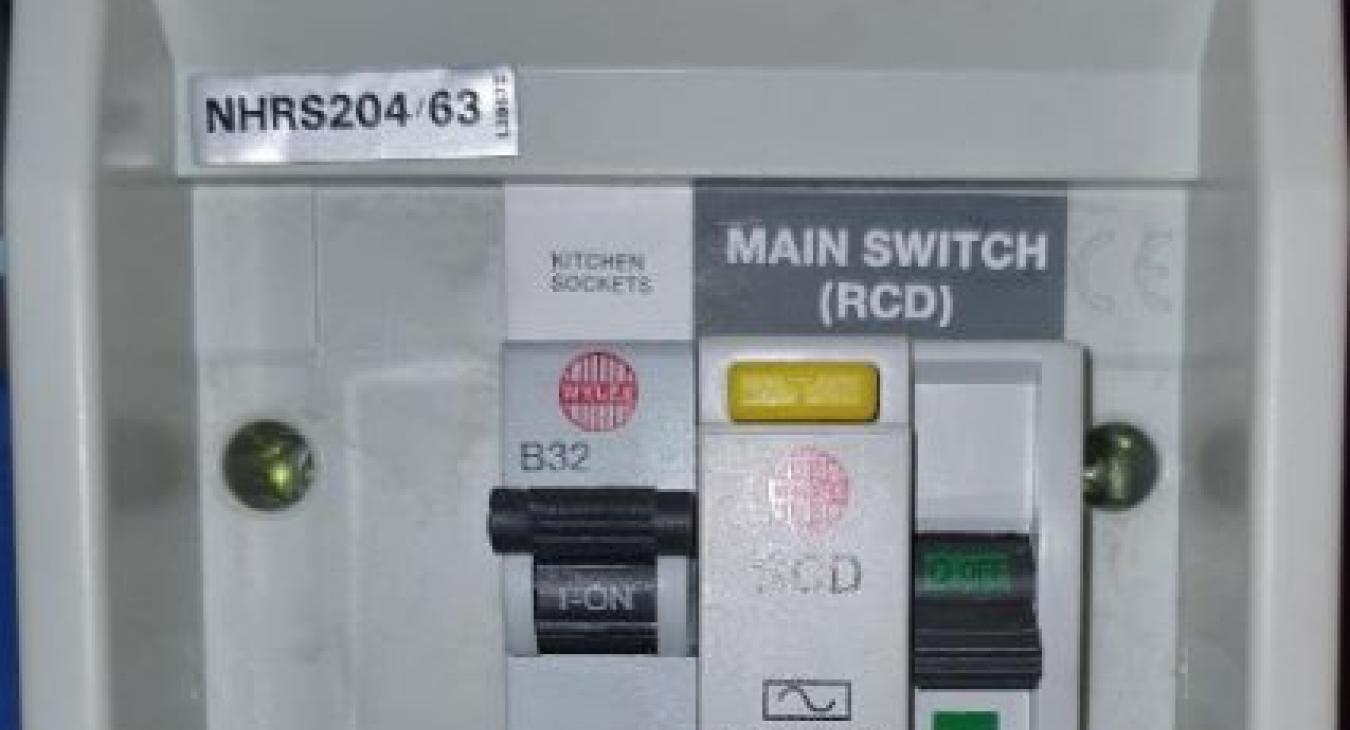
When a PLUG SOCKET TRIPS A SWITCH the electrical system is not as it should be. When a circuit breaker trips there is normally electrical danger present and investigation should be carried out by a qualified electrician to establish what has happened. There are several reasons why this kind of issue may happen with a plug socket and I have come across them all during my time working with electrical systems.
- Faulty or Damaged Plug Socket
- Wiring Issues
- Socket Circuit Problems
- Problems on other circuits
- Trip Switch Faulty
1) Faulty or Damaged Plug Socket
When a plug socket becomes damaged the internal mechanisms can fail causing unwanted electrical connections. Electrical systems are designed to trip the power off when unwanted connections between electrical conductors appear. If a Plug Socket has become faulty inside for example cracked, damaged, or melted parts, then it is possible that Live, Neutral or Earth metal parts are now all touching one another where they previously were not meant to.
These unwanted connections will cause switches or other protective devices to trip the electricity supply off to the circuit or bunches of circuits causing inconvenience and disruption.
IF you suspect that a plug socket has become faulty or damaged then its best to let an electrician check it out for you as they will be able to determine through test procedures if the socket is faulty or if the fault lies elsewhere.
Back to top2) Wiring Issues
Sometimes there can be wiring issues at the terminals on the rear of the plug socket or with the wires behind the plug socket face itself. When wires touch each other or touch (for instance) the metal box that holds the socket face in place electrical problems occur.
We can commonly see fuses blowing, RCD or MCB trip switches blowing or tripping off and there may even be flashes from the plug socket in some circumstances which indicates serious issues that need attention. If you plug socket is flashing then please read our article on this.
Sometimes, and more often than not in kitchens, there are too many wires cramped into a box behind a socket. These wires will often feed other plug sockets, fuse connection switch units for appliances and other equipment in the kitchen. When too many wires are jammed into a box behind a plug socket, wiring damage can occur that is difficult or expensive to repair. In some cases, the plug socket may have to be removed and a blank plate installed in its place if there is little room to repair wires in the back box.
Back to top3) Socket Circuit Problems
If a PLUG SOCKET TRIPS A SWITCH, then it may not be anything to do with THAT particular plug socket and there could, in fact, be issues elsewhere on the plug socket circuit. If you suspect that one plug socket is faulty when you plug a particular appliance in then you could check the appliance in other plug sockets on the circuit and see if it trips those too.
It could be that the appliance or electrical item itself is faulty in which case, the switch at the consumer unit should trip every time the appliance is tested in ANY plug socket.
Socket circuit problems can be difficult to diagnose without the correct test equipment, experience, and knowledge. Electrical testing and fault finding can be dangerous without proper training and safety precautions so it's often best left to a professional to find the issue and rectify any faults that are found.
Back to top4) Problems on Other Circuits
If you trip a switch when you use a plug socket it MAY NOT BE the plug sockets that are faulty!
Strange, eh? Believe it or not, there can be electrical problems on lights, alarm, cooker or other electrical circuits that may mean that using the plug sockets trips the power off.
If you have a specific style of consumer unit then many circuits are often protected by one device. This one device will not trip a particular circuit but rather a bank or collection of electrical circuits causing absolute confusion in the event of an electrical fault.
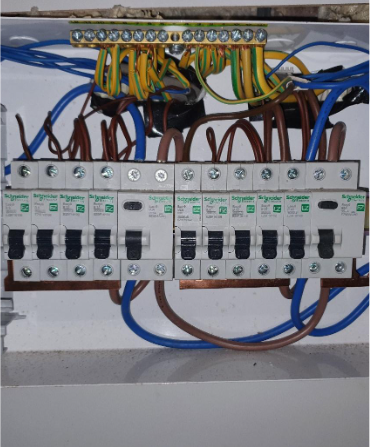
A specialist electrical fault-finding electrician will be able to diagnose and locate the issue within a couple of hours normally.
Back to top5) Trip Switch Faulty
The most unlikely cause of tripping is in fact, a faulty trip switch. I have spoken with many customers who are adamant that their switches are faulty because they are tripping off when, in fact, there are electrical problems with the wiring, sockets or other electrical accessories in the home that are causing the problem.
The tripping of a switch is the symptom, the cause is often located in walls, floors, behind sockets, behind switches or with electrical appliances.
When switches trip they are often just doing their job and disposing of electrical fault currents, protecting the wiring and occupants in the home from fire and electric shock. When a switch does go bad then we often have to find the electrical fault that caused the switch failure AS WELL as replacing the switch.
Back to top6) Common Causes for Trip Switch Problems
Faulty appliances – When appliances fail internally, there can be no external signs which can be confusing when trying to establish which appliance may be the faulty one. When appliances age, their internal wiring, electrical parts, and circuitry can begin to break down. When this process happens, modern consumer units will often detect electrical current that is leaking away from the circuits and will trip off switches causing power loss.
Moisture Ingress – When electrical systems are subjected to water, various problems can occur. Cable insulation is often compromised by the slightly conductive nature of water causing electrical current leakage from one conductor to another. Shorting out can occur if water bridges gaps, arcing and sparking are common and electric shock risk rises as water is present.
Cable Damage – Cable damage can often go unseen. Rodents will do a lot of damage to cables inside floor or loft cavities and will strip the outer sheath of a cable causing tripping of switches and expensive repairs. Cable damage can also occur through accidental damage such as the installation of loft boarding or DIY activities. Sometimes, cable damage may not be immediately apparent on the outside of the cable but inside the cable insulation could be crushed and compromised.
Back to top7) Questions and Answers:
7.1) Is it safe to reset a tripped breaker?
When a breaker has tripped, it is often as the result of a short circuit, ground fault (or earth fault). In these circumstances it is often not safe to reset the breaker. Resetting the breaker once should be ok but if it trips again then the issue needs to be investigated. The breaker will not trip indefinitely without eventually failing.
When the breaker does eventually fail then there could be no protection from electrical faults, electrical fire, electric shock, or circuit overload. There is also likely to be more expense involved in performing the repair once this has happened. The breaker is there to disrupt the flow of electricity in the event of electrical faults and if it were to fail then protection is compromised.
7.2) How many times can a breaker trip before it needs to be replaced?
If a circuit breaker is the device that is tripping and the reason it is tripping is due to overload from high-power appliances and therefore too much power being used rather than a sudden surge of electricity from faulty wiring then the breaker is likely to trip off rather gently. This gradual overload of power is far kinder to the breaker than dissipating large fault currents from a serious electrical issue.
When disposing of large fault currents, the electrical circuit breaker has to dissipate the electric current through its internal mechanisms which can take its toll on the breaker within a few trips.
Every circuit breaker has a maximum safe fault current rating beyond which the breaker will fail to operate again safely. When fault currents approach the level of this rating then the breaker is likely to survive less tripping than with lesser fault currents.
7.3) What about Residual Current Devices (RCD’s)?
If there is an RCD, GFCI, RCB device tripping then there is an issue in the electrical system that would otherwise by giving rise to electric shock risk!
When an RCD trips it does so because there is too much current missing from the electrical circuits (in tiny amounts normally). This device protects against electric shocks and is one of the most important electrical components in the consumer unit / electrical panel.
The most common reason these devices trip is due to a faulty appliance. Nevertheless, if these devices are reset too many times they will also fail permanently and require replacing by an electrician.
7.4) Why does my plug socket keep cutting out?
Commonly, a double socket will have one side begin to fail first. You may find that one side cuts out and one side appears ok. This can be down to a loose connection internally to the plug socket or at the electrical terminals on the rear.
The source of the problem is often a prolonged high current flow through the socket from large power-hungry appliances like a dryer, washing machine, dishwasher, oven and so on. These appliances typically reach the safe electrical current rating of the socket ALONE and any additional demand on the socket from a second appliance can begin to overheat the internal connections causing melting, oxidation, and high resistance to electrical current flow.
There could of course be issues with the appliance plug which you are attempting to connect to the plug socket.
It’s a good idea to have a correctly licensed, professional electrician come to check things out and make sure that the source of the problem has been correctly identified and fixed for your peace of mind.
7.5) Why does a plug socket pop or crackle?
If you are experiencing a plug socket that crackles or pops then this is a sign of danger. Occasional flashes can be normal when plugging in or unplugging equipment but crackling noises are a definite sign of issues. If you are at all unsure of the safety of your plug sockets or electrical equipment then definitely consult an electrician.
If you notice a burning smell from any electrical outlets or electrical devices then turn the appliance or plug socket off immediately and where possible, isolate the affected single circuit at the electrical panel.
Back to top
